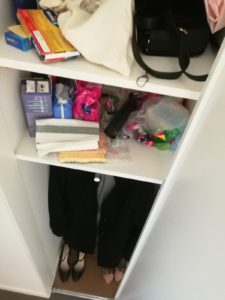
Photo: Eric Rolph
I do not know about your closet, but mine is small. To be fair, so is my apartment. Twenty square meters of fake wood paneling is just enough surface area for one newly-settled university student. Complete with all the essentials: a bed so narrow I almost fall off every morning, a desk that is spacious for one person but cramped for two, and a kitchenette where the fire alarm has set off more than once.
All the same, it is more comfortable than the closet. Those sixty square centimeters are crammed with toiletries, enough jackets to survive nuclear winter, two pairs of high heels, a lint roller, and me.
When I first arrived in Reims, I did not think I would find myself shacked up with the coats – an unexpected situation made even more uncomfortable by the fact that I had never been ‘closeted’ before. Four years at a liberal Canadian high school, along with my close-knit group of predominantly LGBT friends, meant I had not thought about ‘coming out’ in a long time. I did not necessarily find myself at the Toronto Pride Parade every June, but I never felt any apprehension about saying the words “my girlfriend” either.

“[…] extra toiletries, enough jackets to last nuclear winter, two pairs of high heels , a lint roller, and me” Photo: Michelle Wei
And then I arrived at Sciences Po, an ocean away from all the people I could count on to laugh when I replied to their “be straight with me” with a “but I’m gay”. I spent the Integration Week and the whole first month meeting 1As, 2As, Eurafs and Eurams. I introduced myself to an endless stream of new faces, many of whom rapidly changed from strangers to friends.
But each time, as soon as the conversation crossed the ten-minute mark, I would think to myself, is this it? Should I say that I’m bisexual? Do I subtly steer the conversation towards gay rights to test the waters? Do I leap onto the nearest table and start waving a rainbow flag back and forth? My mind would flit from one extreme to the other as I awaited a gap in the dialogue for my opening.
Without even knowing it, I had been forced into the closet, guided there by social conformity and the double-edged heterosexual norm. I assumed that everyone I met was straight and thus I had the obligation to come out. Everyone else assumed that I was straight unless I explicitly stated otherwise. Under this law of ‘heterosexual until proven otherwise’, I had to bite my tongue, grit my teeth and smile tightly whenever I heard Sciences Po’s favourite “that boy is cute but he’s probably gay” joke. No one else found the idea of pigeonholing strangers based on a set of often inaccurate stereotypes offensive, so why should I?
Heteronormativity weaves centuries of oppression, persecution and misunderstood labels into the perfect trap: coming out. The perceived necessity to come out puts LGBT people in the closet by default, whether we choose to be there or not. While on one hand this enables some individuals – who are closeted in order to avoid potentially dangerous situations – to protect their identity, the premise is also based on a fundamentally imbalanced double standard.
The problem lies, not with the rule of ‘coming out’ itself, but with the exclusivity of who and what that rule applies to. There is no requirement to ‘come out’ as heterosexual. I do not have to ‘come out’ about my ethnicity or my political affiliation or any other part of who I am. People in the LGBT community need to publicize their identities in order to be legitimized. This is a mark of societal ostracization on a subtler scale – a line that neatly divides who we readily accept as normal and who we do not.
I did not want to come out again. I did not want to have to come out again. I wanted to say the words “my girlfriend” as well as “my boyfriend” without the conversation stuttering to a short but inevitable halt. I wanted the right to exist without any label except those of my own making.
The easiest solution would be to purchase a label maker, but the true solution involves less money and more effort. I propose a shift in perspective, a strategic dehumanization process to use when we first encounter a stranger.
Think of it as a thought experiment: a world in which we do not meet people as people, but as blank quizzes waiting to be completed. These quizzes are not meant to be graded, just to gauge what you already know. In this scenario, you sit down and flip the quiz over. The questions are simple, they are about yourself and you finish early. Your neighbour on the other hand, has not completed a single question.
You do not yank the pen out of your neighbour’s hand to write their answers for them. You wait for them to fill in the blanks for themselves.
Consider my quiz filled in.
Michelle Wei is an Opinion writer for The Sundial Press. Born and raised in Toronto, Canada, she is now a first year student at Sciences Po in the Dual BA with the University of British Columbia.
Other posts that may interest you:
- Be Radical, Not Neutral
- The Canada We Don’t Talk About
- Sexual Violence in the Spotlight
- 100 Years at Vimy Ridge
- Listen to my Politically Correct Opinion
Discover more from The Sundial Press
Subscribe to get the latest posts sent to your email.





